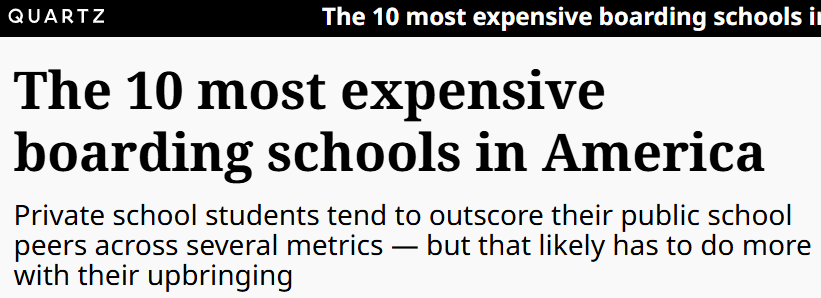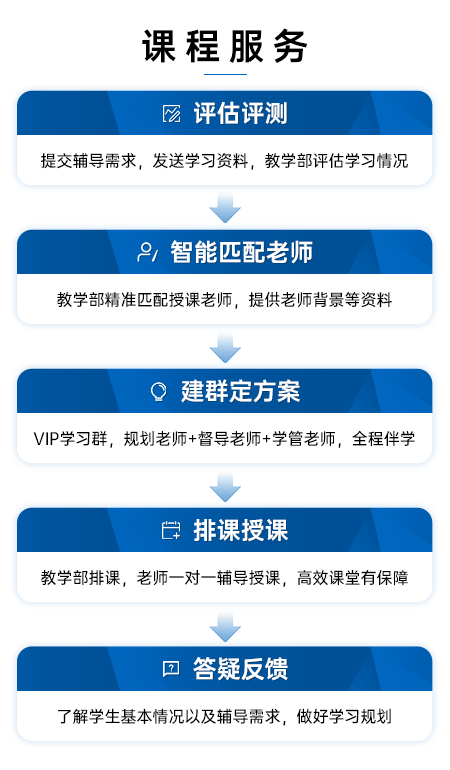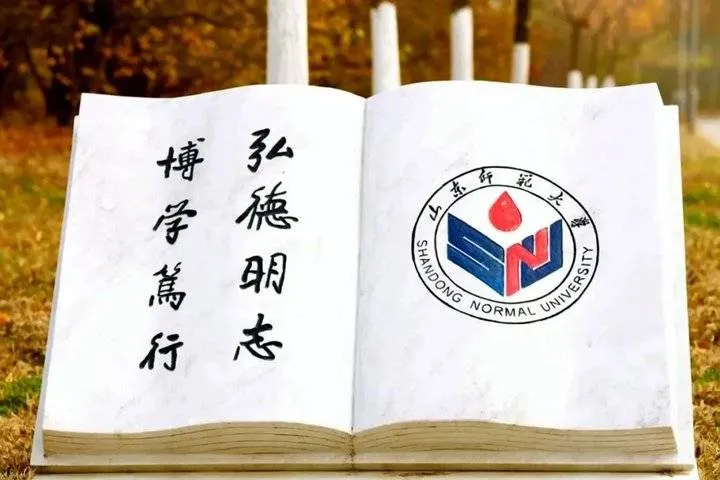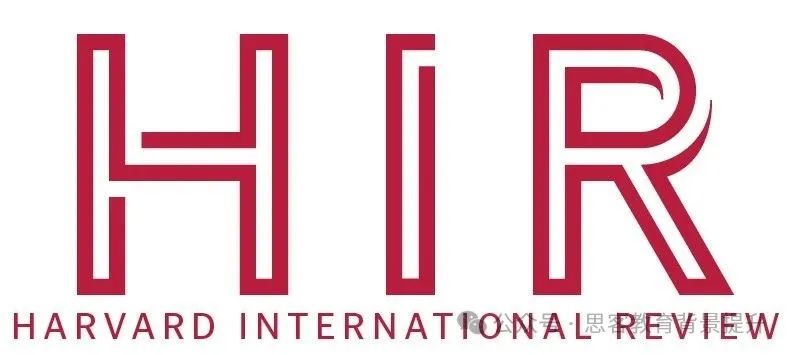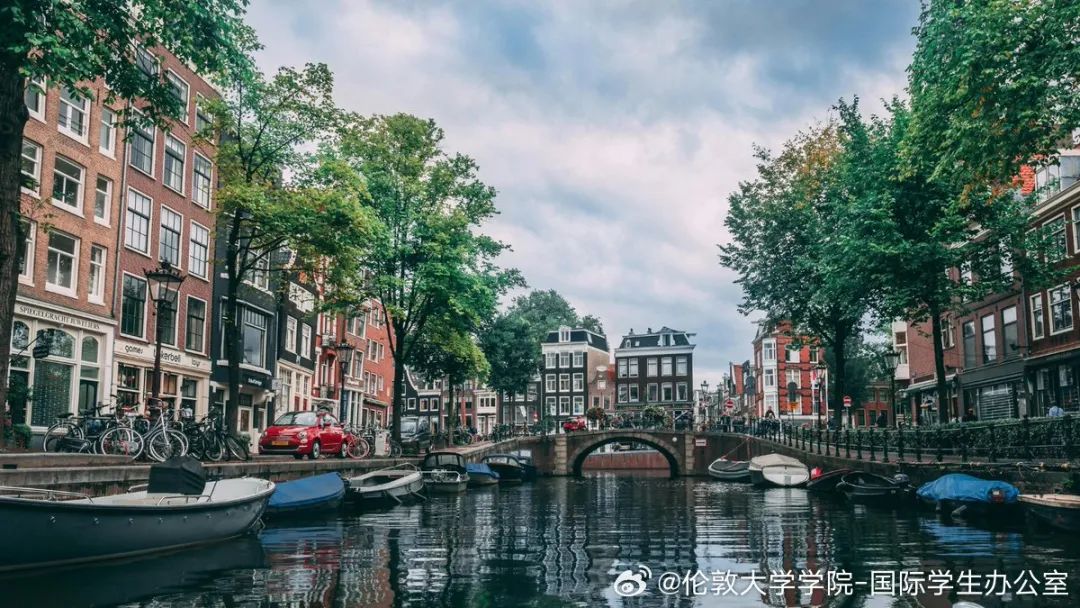《纽约时报》New York Times(NYT)是美国最大的本地都市报,也是美国三大报纸之一。纽约时报系列写作比赛是《纽约时报》举办的,全年滚动开展。如果学生投稿文章,能够得到评委的青睐乃至获奖,登上该报刊,无论是对申请理工科还是文商类专业的学生,都会起到非常重要的助力作用。2025全新的评论大赛即将开启,你准备好迎接挑战了吗?
01· 我的清单:不同类型的评论竞赛 ·


时间:2025.1.15——2025.2.12
内容:选择三到五件艺术品或文化作品以某种方式分组,然后用 600 字或更少的字告诉我们为什么我们应该或不应该查看它们。
适合学生:全球13-19岁初中和高中生均可投稿参加
重点:我的清单中可以包含什么,不能包含什么?
由于这是一场有关艺术和文化的比赛,我们邀请您在列表中包含任何符合《纽约时报》评论的创意表达类别的内容:建筑、艺术、书籍、喜剧、舞蹈、时尚、电影、音乐、播客、餐厅、技术、戏剧、电视节目或视频游戏。
例如,由于《纽约时报》评论戏剧,因此您可以列出您认为学校应该上演的三部舞台剧。由于《纽约时报》评论时尚,因此您可以列出您认为被高估的运动鞋。但是由于《纽约时报》不评论体育用品,因此您无法列出五款最佳滑板的列表。
02·内容要求 ·
选择三到五件艺术品或文化作品以某种方式分组,然后用 600 字或更少的字告诉我们为什么我们应该或不应该查看它们。
您选择的作品必须至少符合《泰晤士报》评论的以下创意表达类别之一:— 建筑— 艺术— 书籍— 喜剧— 舞蹈— 时尚— 电影— 音乐— 播客— 餐厅— 科技— 剧院— 电视节目— 视频游戏如果您愿意,也可以混合类别。您的清单需要包含以下内容:
1. 主题明确的标题。例如,“三本有着出色青少年角色的小说”、“四部连讨厌科幻的人都会喜欢的科幻电影”或“五种最难吃的快餐三明治”。
2. 标题和主题越具体,文章就越有趣。记住,你的角度可以是积极的——告诉读者应该看什么——也可以是消极的——告诉读者应该避免什么。简短介绍您的系列。以吸引人的开头,然后解释此系列适合哪些人以及为什么观众会对它感兴趣。
3. 三到五件与主题相关的艺术或文化作品,每件作品都附有简短的评论。您对每件作品的评论既应将作品与主题联系起来,又应表达您对作品与主题相关的想法和意见。与提出论点时一样,请记住用证据支持您的观点。
03·参赛收获 ·
1.提升批判性思维与媒体素养:
比赛鼓励学生通过策展实践,学习如何批判性地消费信息。在信息过剩的时代,学生们需要培养选择、组织、提供背景、引用证据的能力,以便为他们关心的主题辩护。这不仅有助于他们分析和思考,也能提升他们的表达和创造能力。
2.实践创造性表达:
比赛邀请学生在选择和组织内容时展现创造力,帮助他们思考如何用独特和富有想象力的方式进行分组和展示。例如,学生可以通过列出不同主题的清单来表达对所学知识的理解,并通过展示他们的个人观点和创造力来增强学习的乐趣和成就感。
3.跨学科融合尝试:
比赛允许学生根据自己所学的不同学科(如历史、STEM等)选择具体主题来策展。这种跨学科的结合不仅能够加深他们对专业知识的理解,还能激发他们发现学科之间的联系和实际应用的兴趣。例如,历史系学生可以列出反映文艺复兴的艺术作品,STEM学生则可以通过电影或播客来探索物理或数学概念。
4.助力升学,提升申请竞争力:
参加这项比赛不仅有助于学生拓宽视野,提升综合能力,还能在申请本科时为他们加分。通过策展实践,学生能够展示他们的批判性思维、创新能力和跨学科的知识应用,这些都是大学录取委员会十分看重的素质。特别是在众多申请者中,拥有独特经历和实际项目的学生将更具竞争力。比赛的参与过程和成果可以成为申请材料中的亮点,帮助学生在升学过程中脱颖而出,提升他们的申请优势。
04· 评分标准 ·
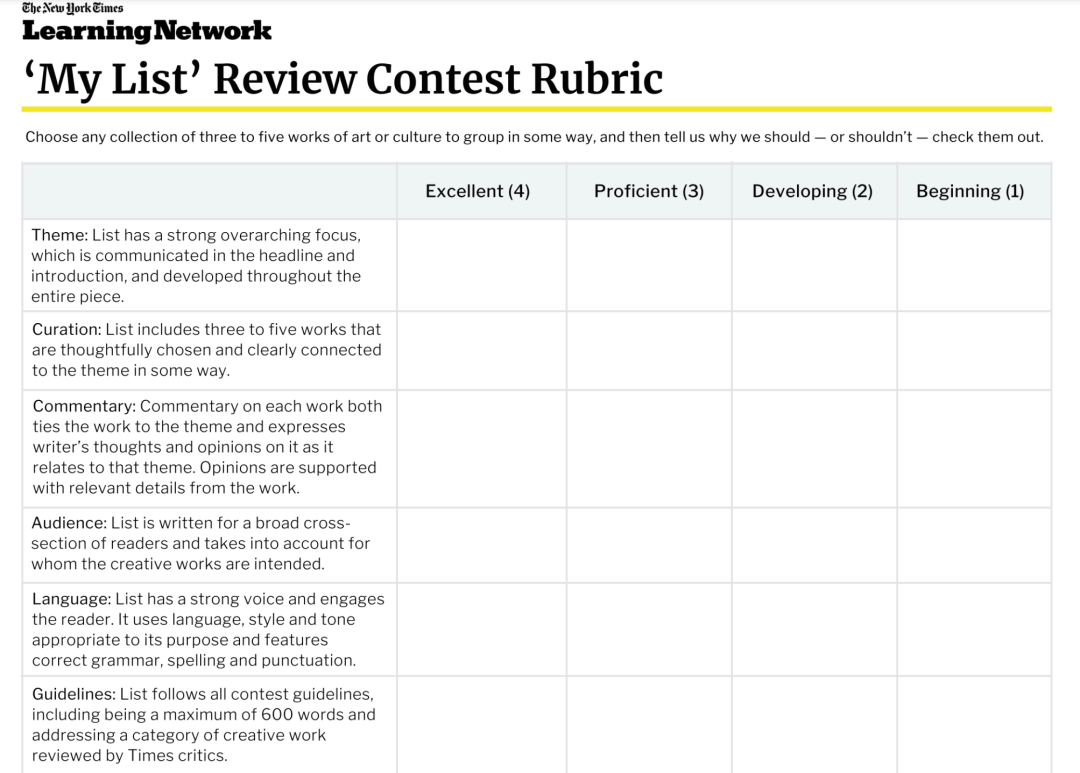
获奖者将在 2025 年 4 月左右宣布
05· 参考作品展示 ·
6 Podcasts About the Past That Resonate
Covering everything from ancient civilizations to 20th-century war craft, these shows deliver incisive and engaging history lessons.By Emma DibdinJuly 4, 2024Over the past few years, debates have been waged over how American history should be taught in schools, particularly subjects like slavery and racism. Covering everything from ancient civilizations to 20th-century politics, these six shows deliver incisive and engaging lessons that will resonate no matter how much you learned (or paid attention) in history class.‘The Dollop With Dave Anthony and Gareth Reynolds’This comedic history staple was an early example of a podcast format that’s become ubiquitous: one host talks in depth about a particular subject to a second host, who’s unfamiliar with the topic. In each episode, the comedian Dave Anthony reads out a different story from U.S. history to his co-host, Gareth Reynolds, with topics including politics, sports, even the origin story of cereal in America. Because Reynolds is always coming in cold, his reactions, riffs and impersonations feel spontaneous in a way that only improv can, and the pair’s natural chemistry makes the laughs infectious. The blend of off-the-cuff humor and rigorous research has made “The Dollop” a podcast-chart mainstay for more than a decade, and ensures that the show remains accessible to a wide swathe of listeners beyond history buffs.Starter episode: “Ronald Reagan with guest Patton Oswalt (Part 1)”‘Fall of Civilizations’Hosted by Paul Cooper, a historian and novelist, this podcast burrows into the stories of once-mighty ancient civilizations, exploring the complex web of political, economic and human factors that built them up and ultimately tore them apart. Episodes are infrequent (on average just two or three per year), but they’re dense and detailed epics, running more than two hours apiece and woven together from sources, including historical records, archaeological findings and contemporary academic opinions. Over the show’s 16 episodes, the collapses covered include the Cambodian Khmer Empire, the ancient Sumerians of Mesopotamia and the still-mysterious society that once existed on Easter Island. The listening experience feels like reading a comprehensive book from cover to cover, but with none of the dryness that might imply thanks to the immersive quality of Cooper’s retellings.Starter episode: “The Catastrophic Fall of Roman Britain”‘Behind The Bastards’Hosted by the journalist Robert Evans, alongside a revolving series of guests, the podcast examines history through the lens of its very worst men. The definition of “bastards” is expansive, encompassing historical tyrants and dictators, abusive men in Hollywood and contemporary politicians and corporate executives. Also included are businesses and industries, like the East India Company, Purdue Pharma and the payday loan industry. Even when covering well-trodden ground, “Behind the Bastards” finds fresh and enjoyably weird angles — for example, the episode titled “Hitler: Y.A. Fiction Fan Girl.” Evans, who has reported on conflict zones, police brutality and far-right extremism for the investigative news website Bellingcat, also has a knack for drawing parallels from the past to the present. In June of 2020, following the murder of George Floyd, for example, he produced a mini-series spinoff titled “Behind the Police,” which explored the checkered history of policing in America.Starter episode: “Part One: The Most Evil Company In History”‘In Our Time’This beloved BBC Radio 4 series has a long history of its own, having celebrated its 1,000th episode last year. Hosted by the veteran broadcaster Melvyn Bragg, the show offers rigorous discussions on subjects spanning philosophy, culture, science and history, while its podcast version breaks these areas out into their own feeds, allowing a more customized listening experience. In each episode, Bragg leads a conversation with a panel of three academics who come ready to debate. Some episodes tackle a broad subject — the history of coffee, say, or the surrealist movement — while others focus on a historical figure like Marie Antoinette, or a consequential day in history like the 1572 Saint Bartholomew’s Day Massacre. No matter the topic, “In Our Time” is always a rich and soothingly smart listen.Starter episode: “Napoleon’s Hundred Days”‘The Rest Is History’This enlightening and amiable series is hosted by two British historians with very different areas of expertise: Tom Holland focuses on ancient and medieval history, including the Roman Empire and early Islamic period, while Dominic Sandbrook studies contemporary history, particularly postwar Britain and 20th century America. Their distinct approaches make for an engaging dynamic as they discuss a variety of historical subjects. “The Rest is History” typically devotes four or five episodes to a single subject, which might be the life of a historical figure like Helen of Troy or Winston Churchill, or the story of a single incident, like the sinking of the Titanic.Starter episode: “Young Cleopatra”‘Revolutions’History is sometimes defined as the study of change, and this long-running series (which ended in 2022) focuses on that theme, exploring moments of regime change in societies. Each of the show’s 10 seasons chronicles a different political revolution in extraordinary depth. Which one you should start with largely depends on how much time you want to invest: Season 2, which focuses on the American Revolution, runs 15 episodes (each 30 to 45 minutes); whereas the epic final season on the Russian Revolution stretches more than 100. Mike Duncan, the creator and host, started his first audio series “The History of Rome” in 2007 (the prehistoric era of podcasting) while working as a fishmonger, and even when the show evolved from a side gig to full-time job, his palpable enthusiasm for his subject makes “Revolutions” feel like a passion project in the best way.Starter episode: “The Three Estates”A version of this article appears in print on July 7, 2024, Section AR, Page 6 of the New York edition with the headline: History’s Humor, Drama, Scandal. Order Reprints | Today’s Paper | SubscribeThe State of PodcastingIn a podcast landscape where famous people are always talking to each other, “Podcrushed” is tweaking the celebrity-interview formula by adding two non-famous people.Mark Zuckerberg talked to a packed house of more than 6,000 attendees for the “Acquired” podcast. It’s a sign of how tech titans reach the public now.After partnerships with famous names fizzled in previous years, podcast companies are back to paying huge sums to stars with a proven track record as hosts.For hosts of chat podcasts, a growing genre, chemistry — that intangible spark shared among two or more people — has become an invaluable resource.After 12 years, the hosts of “Longform” will soon release its final episode, capping a podcast that unwittingly captured the shifts in the journalism and publishing industries.







